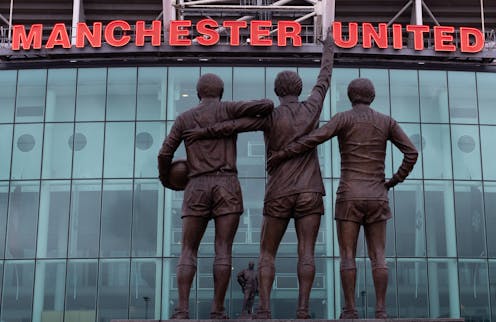
The last 11 years have been a pretty bleak period for Manchester United. Supporters seeking a return to the glory days of manager Sir Alex Ferguson have been left sorely disappointed by a succession of managers (and players).
The club’s start to the 2024-2025 Premier League season has been its worst ever. And after the sacking of Erik ten Hag, all eyes are on new head coach Ruben Amorim.
One key problem Amorim faces is re-building the fractured sense of identity around Manchester United since Ferguson left in 2013. Research shows that a team’s sense of identity is vital. It is unifying and an important part of sporting success.
Research also shows that a strong team identity is related to greater levels of confidence, resilience, effort and performance – all qualities which have been somewhat lacking at Manchester United over the last few seasons. Amorim will need to try and rebuild a strong identity if he wants to be successful.
Indeed, plenty of evidence suggests that strong leadership is one of the key requirements for creating a sense of “us”. And leaders who create strong team identities are perceived more favourably, including being more likely to be supported and more able to influence others.
So will Amorim be successful? Can he build a winning identity at Manchester United, which players and fans will connect with? Here are three key areas that he needs to address.
1. Collective language
One simple but effective way to build shared identity and connection is to use collective language – terms like “we” and “us”. Research has demonstrated that political leaders who used those words regularly won elections more often than those who used them more sparingly.
In an interview after being appointed, Amorim did the same, repeatedly referring to Manchester United as a collective group that he was a part of. At the time he had not even taken a training session with the team – but he showed a clear understanding of the need to say the right words.
2. Looking back
Creating a strong team identity for the present and future is helped by understanding the past. Research shows that when a group embraces its history, this can lead to a stronger emotional attachment and an increased sense of belonging.
Again, Amorim has shown signs that he appreciates this. He has spoken not just about the club’s bulging trophy cabinet, but also the Munich air disaster of 1958 which killed 23 people, including eight Manchester United players.
The new head coach said players arriving at the club should learn about its history in the same way, by taking an official tour of Old Trafford. “You see the trophies, you see the tragedy that we have as a club,” he said. “I think this is very important to do.”
3. Style and play
One of the criticisms often levelled at ten Hag was the lack of any clear identity in the way the team played. They didn’t seem to have a style or plan that everyone stuck to.
Amorim’s clear playing philosophy at his last team – Sporting Lisbon – includes a more dynamic, energetic playing style, and a commitment to a system which involves a focus on high pressing and possession.
However, there will need to be flexibility to ensure the playing philosophy aligns with Manchester United’s identity – put simply, he will need to win while playing attractive football. Amorim is aware of this.
Commenting on the need to adapt the style he implemented at Sporting, he said: “We cannot transport one reality to another. United cannot play the way we [Sporting] play, they cannot be so defensive.”
Central to developing this playing identity will be Amorim’s ability to embed it in practice. Evidence highlights that such an approach leads to greater effort and motivation from athletes.
Reports from Amorim’s first training session with his new squad of players suggests he was quick to impose his footballing philosophy. Footage released demonstrated a clear focus on improving players’ work rate and chasing back after losing the ball.
But a training session is one thing. Dealing with the pressure of being in charge of one of the biggest football clubs in the world is something else entirely. Yet if Amorim can get Manchester United playing well and winning matches, it will delight fans, and be something that Sir Alex Ferguson himself can identify with.
The authors do not work for, consult, own shares in or receive funding from any company or organisation that would benefit from this article, and have disclosed no relevant affiliations beyond their academic appointment.
This article was originally published on The Conversation. Read the original article.







